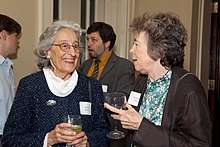Catherine Elgin
Catherine Z. Elgin (born 1948) is a philosopher working in epistemology and the philosophies of art and science.[1] She holds a Ph.D. from Brandeis University where she studied with Nelson Goodman and is currently a professor of philosophy of education at the Graduate School of Education at Harvard University. She is well known for her several joint works with philosopher Nelson Goodman.
Catherine Z. Elgin | |
|---|---|
 Elgin and Amélie Rorty at the Edmond J. Safra Center for Ethics | |
| Born | 1948 |
| Alma mater | Brandeis University |
| Institutions | Harvard University |
Main interests | epistemology and the philosophies of art and science |
Philosophical work
Elgin's work has considered such questions as "what makes something cognitively valuable?" As an epistemologist, she considers the pursuit of understanding to be of higher value than the pursuit of knowledge.[1]
In Considered Judgment, Elgin argues for "a reconception that takes reflective equilibrium as the standard of rational acceptability."[2]
Bibliography
- With Reference to Reference, Hackett, 1983
- Reconceptions in Philosophy and Other Arts and Sciences, together with Nelson Goodman, Routledge, 1988
- Revisionen. Philosophie und andere Künste und Wissenschaften, 1993
- The Philosophy of Nelson Goodman, v. 1. Nominalism, Constructivism, and Relativism, ISBN 0-8153-2609-2, v. 2. Nelson Goodman's New Riddle of Induction, ISBN 0-8153-2610-6, v. 3. Nelson Goodman's Philosophy of Art, ISBN 0-8153-2611-4, v. 4. Nelson Goodman's Theory of Symbols and its Applications, ISBN 0-8153-2612-2, 1997[3]
- Between the Absolute and the Arbitrary (Paperback), Cornell University Press, 1997[4]
- Considered Judgment, Princeton University Press, 1996
- Philosophical Inquiry: Classic and Contemporary Readings, 2007
- Begging to differ, The Philosophers' Magazine, December, 2012
- True Enough, MIT Press, 2017
- "Understanding in Science and Elsewhere": Interview with Catherine Z. Elgin about her philosophy and her intellectual biography, published 2019 on 3:AM Magazine and republished on 3:16
gollark: Quantum entanglement can't actually be used to transmit information as far as I know.
gollark: I didn't actually watch it, I assumed it was an unrelated comment.
gollark: Oh, I see.
gollark: They can be quite small nowadays.
gollark: There's no reason you can't just bring your own atomic clock to Mars or something.
References
- "Harvard: Catherine Elgin". Harvard University. Retrieved 2009-03-01.
- "Considered Judgment". Princeton University Press. Retrieved 2009-03-01.
- Elgin, Catherine (1997). The Philosophy of Nelson Goodman. Taylor & Francis. ISBN 0-8153-2612-2.
- "Between the Absolute and the Arbitrary (Paperback)". Amazon.com. Retrieved 2009-03-02.
This article is issued from Wikipedia. The text is licensed under Creative Commons - Attribution - Sharealike. Additional terms may apply for the media files.